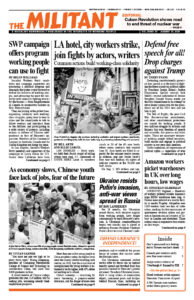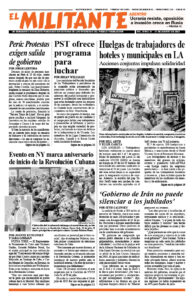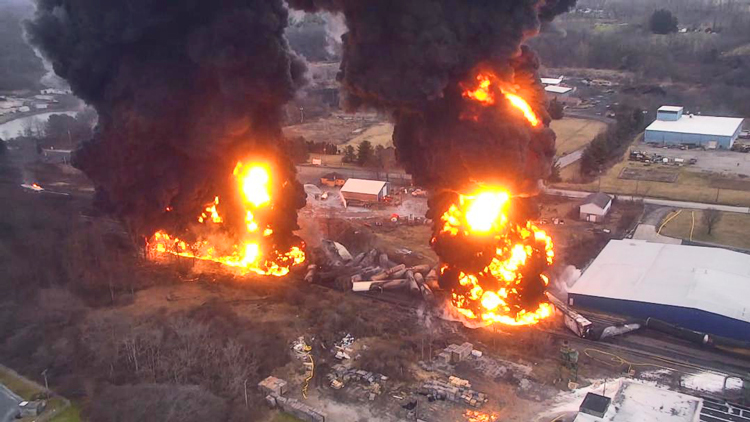LINCOLN, Neb. — Aug. 3 marked six months to the day that 150-car Norfolk Southern train 32N derailed in East Palestine, Ohio, causing a social disaster. The train was almost 2 miles long, weighing 18,000 tons. The derailment dumped 50 cars on the ground, 11 carrying hazardous chemicals, including five tank cars containing toxic vinyl chloride.
The fire and massive smoke plume descended across the area, contaminating the land, waters and air. The first priority of the rail bosses was to get trains running again, rebuilding the tracks on top of contaminated ballast and soil in search of lost profits.
In hearings conducted by the National Transportation Safety Board and elsewhere, rail workers and their unions have explained that the company’s greed is the cause of the derailment. In the bosses’ drive for profits over the last decade, Norfolk Southern and the other four U.S. Class 1 railroads have slashed their workforce, run fewer and longer and heavier trains, raking in cash.
“As long as it’s more profitable to clean up a disaster than to prevent one, these Wall Street-driven rail corporations will continue to hold communities like East Palestine hostage,” Jeremy Ferguson, president of SMART-TD, the largest rail union, which organizes train conductors, said after the derailment. “Trains are much longer than they used to be, with some now over 4 miles in length. Even as the trains have gotten longer, the workforce supporting them has gotten smaller.”
Today, he said, “fewer railroaders with less training are taking longer trains made up of more hazardous materials down tracks with more wear and tear.”
Job cuts and speedup
More evidence keeps coming out about how the bosses’ job cuts and speedup made East Palestine inevitable. On July 29, The Associated Press reported sobering facts on the likely cause of the derailment. It quoted from an interview done by the NTSB with Gary Rambo, a Norfolk Southern automatic train control worker who staffed the Wayside Help Desk the night of the derailment. The board is investigating the disaster following an outcry from East Palestine area residents.
Rambo was working “solo” on a computer at home. The job was a 12-hour shift, with no scheduled lunch break or time to use the bathroom. He was responsible for monitoring every train on the company’s 19,500 miles of track to see if any of the company’s hundreds of Wayside detectors reported any overheating axles.
That night he was busy. When the detector in Salem, Ohio, some 20 miles from East Palestine, sent him an alert that the temperature of a wheel bearing on the 23rd car of Norfolk Southern train 32N had soared to over 103 degrees F, he didn’t notice. He said he gets around 300 alerts on a shift.
“Honestly, I didn’t see it when it first came in,” he testified. “There were three other trains I was working on.”
These alerts are not sent to the train’s operating crew. The rapidly rising temperature was just short of what Norfolk Southern required before an emergency alert would have gone to the workers on the train. But if Rambo had seen it, he would likely have intervened.
Rambo said there used to be two people on each shift, but that was eliminated as part of the bosses’ staffing cuts.
When the train got to the next detector, in East Palestine, it read over 250 degrees F and alerted both Rambo and the crew. The engineer tried to stop the train, but it was too late, and cars started coming off the tracks.
Rambo told the NTSB he didn’t know for sure the train had derailed until he heard from the chief dispatcher’s office that “we got a lot of cars on the ground” and “they’re on fire.”
Astonishingly, Norfolk Southern responded in a statement, saying, “The Wayside Help Desk functioned as it was supposed to with respect to Train 32N.”
Similar staff cuts and speedup implemented by profit-hungry bosses force track inspectors and all other rail crafts into similar difficulties.
Derailments in East Palestine
There is a long history of derailments in East Palestine and along the tracks that Norfolk Southern train 32N traveled on.
A 1970 derailment sent a Penn Central freight train careening into a bridge there. Two people driving over the bridge narrowly escaped injury.
Penn Central bosses promised to pay for a new bridge, but declared bankruptcy soon after and never paid. The bridge sat unfixed for years, preventing emergency crews from reaching parts of town when trains blocked rail crossings. The city and county wound up footing the bill for a new bridge.
In March 1973 an Amtrak passenger train derailed and crashed into a fabricating plant near the tracks, killing an Amtrak worker “deadheading” on board and injuring 19 other passengers.
The Salem News reported at least nine freight derailments in East Palestine between 1946 and 1976, including one in 1961 that crashed into another factory. Several of the derailments were caused by poorly maintained tracks.
On July 20, 1973, a Penn Central freight train derailed in Fort Wayne, Indiana, on the same line that runs through East Palestine. Eight cars loaded with hazardous materials, including two tankers carrying vinyl chloride, went off the tracks. One was punctured, leaked vinyl chloride, caught on fire and exploded, sending out shrapnel that destroyed a nearby house. Some 3,000 people within 2 miles were evacuated.
Like in East Palestine, firefighters there weren’t told what types of chemicals they were dealing with, and didn’t have masks or protective clothing. The tracks were relaid and no serious cleanup was organized.
The federal government bought up Penn Central, creating Conrail in 1976. This helped bring the rail line up to profitability, and it was then sold to Norfolk Southern and CSX.
Under public pressure, Norfolk Southern claims to have changed its policy on overheated bearings, following a coal train derailment in Virginia last month.
Randy Fannon, leader of the Brotherhood of Locomotive Engineers and Trainmen union’s safety task force, said that someone at the railroad’s headquarters in Atlanta working the “hot box detector desk” told the crew to go ahead and move the train 8 miles down the track. The crew told union officials that they weren’t comfortable with moving the train at the track speed of roughly 40 mph, so they kept the speed to around 20 mph. But the train still derailed.
“We’re just lucky right now that it’s coal. If it had been ethanol or LP gas or chlorine or anything like that, it could have been a totally different situation,” Fannon said. “I think the key to this is no qualified mechanical person inspected the train.”
The new policy, the bosses claim, says anytime a hot bearing is reported, they will send out a mechanical inspector before the train can be moved. And if that is permitted, the train can go no faster than 10 mph, stopping every 3 miles for the crew to reinspect the bearing.
The rail bosses hate interference, claiming their “business secrets” are inviolate. But East Palestine shows once again that this only means they’re free to place our health, safety and living conditions in jeopardy.
Rail workers and their unions need to force the “secrets” of the rail bosses out into the open and fight for control over train operations and safety. This is the road forward for both rail workers and those who live near the tracks.


